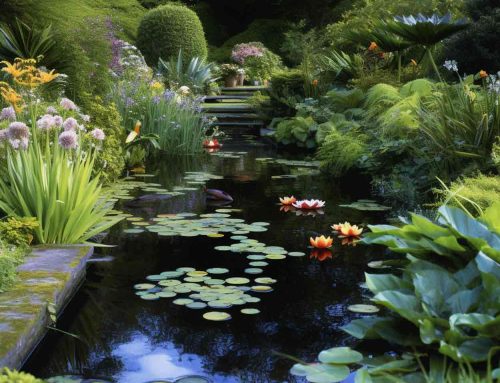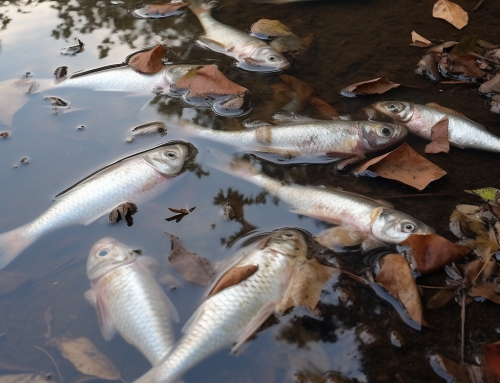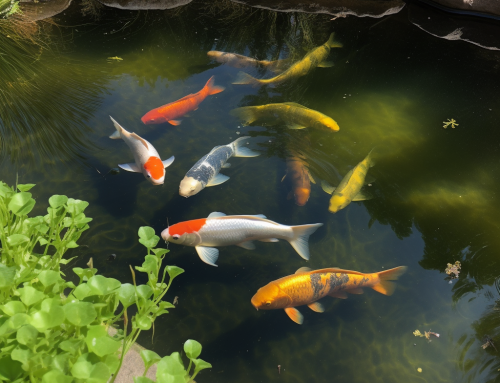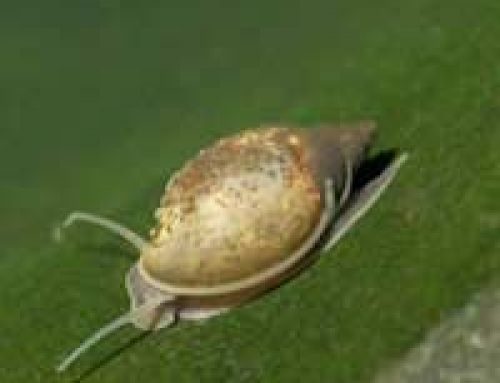
Pests are a feature of the pond just as much as they are in the rest of the garden, but keeping them under control calls for a slightly different approach. Fortunately, keeping most of the commonest water garden nuisances at bay is not too difficult, especially if you stay vigilant, know what to look for, and act without unnecessary delay.
Pond Plant Pests
Although many kinds of aquatic insects – and tadpoles too, for some of their life – eat vegetable matter, the biggest cause of noticeable damage to pond plants tends to come from pond snails. Like their terrestrial cousins, these molluscs can do a surprisingly large amount of damage in a relatively short space of time, especially when there’s new, tender growth to be eaten!
Slug pellets are obviously not going to work here, but fortunately water snails are much less secretive than their land kin, which makes them considerably easier to see – and remove by hand, which is probably the most practical means of keeping them under control.
Some pond plants, however, have particular problems – and there’s no kind more plagued by their own, personal group of pests than the water lilies. They are, for instance, prone to their own specialist aphid, Rhopalosiphum nymphaeae, and a water-lily-specific leaf beetle, Galerucella nymphaeae. Using insecticides to deal with these kinds of pests is seldom possible, largely because of the damage using these chemicals could do to the delicate pond ecosystem – and the potential havoc it could wreak to the biological filtration system. With these and other similar insect problems, the best solution is often to aim to rely on natural pest control, building up the local population of ladybirds, hoverflies and the like, and planting useful plants such as alliums and pyrethrums which have natural insecticidal properties.
Then any bugs that do persist can be periodically blasted into the pond with a jet from your hose, to provide a meal for the resident fish and other wildlife.
Gnats, Mosquitoes and Their Kin
Of course, not all of the pests that may chose to make their homes in and around your pond are there to make a meal of your plants; some of them have their sights firmly set on you! Unfortunately, when you add a water feature to your garden, you can also be rolling out the welcome mat for a whole host of unwanted biting insects, by creating an ideal breeding ground for them – and a nursery for their larvae. Mosquitoes are probably the most familiar of the pack, but this unwelcome clan also includes a number of species of gnats, as well as the dreaded Scottish midge, which more than makes up for its miniscule size by sheer weight of numbers coupled with a voracious appetite for blood – and climate change means it’s slowly spreading south!
As with plant pests, pesticide spraying is a definite ‘no-no’ around the pond itself, but fortunately, garden ponds do have a couple of natural advantages when it comes to keeping these nuisance insects under control. Firstly, these bugs prefer still conditions, so a water feature that has been equipped with a good, strong pump will tend to seem less attractive to mosquitoes and their kin – and such a set up brings the obvious additional benefits of boosting aeration and improving the efficiency of the filter system. Secondly, a pond containing ornamental fish or one which provides a home to wildlife, comes with pest control built-in, in the form of countless hungry mouths, ready to make a meal of the adults and their larvae.
If, despite this, you find the insects still bite, a few citronella candles or a small UV insect trap may be all you need to keep your evenings bug-free.
Cats and Herons
Every fish keeper knows only too well the damage a hungry heron or next door’s moggie can do to their prized collection, and if you suspect that your pond has become a favourite dining place for one of these professional predators, then you need to act quickly.
Although some people swear by a life-like plastic heron added to the pond edge to deter real rivals from muscling in on what they perceive as its territory, others have found that this time-honoured approach simply acts as an advert to draw herons in their droves to what’s on offer. Two methods which do seem to have widespread approval, however, are to add a low edging fence close to the water’s edge – making it more awkward for the bird to walk up to the pond – or fixing a stout mesh over the pond surface, so it can’t get into the water at all.
Surface mesh will also keep cats out, but if you don’t want to go to all the expense and fuss of fitting one, especially if the neighbourhood cat only pays occasional visits to your garden, a motion sensor water “cannon” can be a good alternative. Widely available by mail order, online and from garden centres, you attach it to the end of your hosepipe and then stand back; once the unit’s PIR detects moggie’s movement in the protected area, an icy jet of cold water is triggered in its direction – sending the alarmed, but unharmed, feline in search of easier pickings elsewhere!
As a general rule, ponds are blighted by proportionally fewer pests than most other elements in the garden, but that is scant consolation when something is making a meal of your perfect planting scheme or prized fish collection. Fortunately, for the most part, pond pests and predators can be dealt with in a fairly straightforward way, and if you act promptly when you first notice a problem developing, you’ll soon get back to enjoying the peace and tranquillity that ponds are supposed to be all about.
Pond Predators FAQ
Do Magpies take fish from ponds?
While magpies are not the primary predators of pond fish, they have been known to steal fish from ponds. Herons are the most notorious pond fish predators, followed by other animals like cats, otters, minks, seagulls, and crows. Herons are common in the UK and are thought to be around 10,000 of them. However, magpies are not known to be very effective at catching fish and are more likely to eat small insects and fruits. Nevertheless, it is not uncommon to see magpies near ponds, and it is possible for them to steal small fish from the surface of the water.
What birds take fish from ponds?
Various birds can feed on fish in ponds, with herons being the most common. However, hawks and owls are also known to prey on fish, and they have even better eyesight than herons. These birds have hooked talons that are incredibly effective at scooping up fish. In addition to birds, other animals like cats, otters, minks, seagulls, and crows can also feed on pond fish. Ponds that have fish usually attract a range of predators, and the fish species in the pond can influence the types of predators present. Larger fish are more difficult to catch, and so predators like herons and otters may target smaller fish.
Will a crow take fish from a pond?
Crows can be opportunistic and may steal small fish, including goldfish, from ponds. However, they are not as efficient as other predators like herons or otters. Crows are more likely to feed on fruits, insects, and carrion, but they have been known to take small fish from ponds. Other animals that may take fish from ponds include magpies or seagulls. The presence of predators in a pond can be beneficial in some cases as it can help control the population of prey species, but it can also be detrimental if the predators are too efficient and eliminate the prey species altogether.
Do magpies eat newts?
While magpies are omnivorous and can eat a variety of foods, including small vertebrates like newts, they are not considered a significant threat to newts. In general, newts have a range of predators, including fish, snakes, herons, and other birds of prey. However, newts have a few defence mechanisms, such as the ability to secrete toxins that make them unpalatable to predators. Newts are also nocturnal and tend to hide during the day, making them less visible to predators. While magpies may eat newts on occasion, they are more likely to feed on insects, fruits, and small invertebrates.
Will a frog eat a goldfish?
Adult frogs and goldfish can generally coexist peacefully in a pond, but frogs may eat goldfish if they are small enough to fit in their mouths. Frogs are opportunistic predators and will consume a range of prey items, including small fish, insects, and other invertebrates. However, larger adult goldfish are usually too big for frogs to consume, and goldfish are not a natural prey item for frogs. In general, adding aquatic plants to the pond can provide cover for fish to hide from predators like frogs. It is also important to maintain good water quality to ensure the health of both fish and frogs in the pond.
Will goldfish eat my fish?
Goldfish are omnivorous and will eat a variety of foods, including small fish like baby goldfish if they are small enough to fit in their mouths. Goldfish tend to browse for food and eat small, bite-sized morsels, but they can be opportunistic feeders and will consume whatever food is available, including other fish. It is important to provide appropriate food for goldfish to prevent them from preying on other fish in the pond. Feeding goldfish small amounts of food at regular intervals can help ensure they are well-fed and less likely to consume other fish. Additionally, providing hiding places and cover for other fish in the pond can help protect them from goldfish predation.
Last Modified: April 5, 2023








We have a spring-fed pond with thriving ecosystem (turtles, frogs, duck/heron visitors, every water bug imaginable!…). Among those creatures are Giant Water Bugs, which I have read can bite. That article also said I should try to get rid of them (without telling me how!). Since I have young grandchildren who play in/around the pond, I would like to eliminate these bugs, but is that a problem for the ecosystem? And is there any way to get rid of them without harming other parts of the ecosystem? The one thing we do not have is larger fish. We have lots of tiny (1 inch or less) fish. Would larger fish eat them? Thank you!
i was wondering if you sell mosquito dunks or know anywhere i may be able to purchase them from? i’ve had a look on the net & there doesn’t appear anywhere out side the US that sells them. I’m trying to deal with thrip or a fungas knat outbreak, any suggestions would be appreciated. Regards Stuart.
Should I remove beetle eating my tadpoles from my pond?
We have a garden pond about 12th ft. We only filled it in August. It is establishing really quickly. We have tried to use only native plants. My Wife has seen a leach type thing about two inch long. We don’t keep fish but have seen tadpoles. My Wife is very worried about whatever it is eating all the tadpoles. It is dark brown and formed a S shape and swam to the bottom when sighted. Please does anyone have any ideas on I or if it is harmful. Many thanks.
I have a pond with six fish , for almost a year now . But recently when cleaning out the filters , I have found Small ( 10mm long) red worm like insects They look like some sort of parasite to me Please advise. Thanks John
I have a large garden pond, well stocked with a variety of carp, tench etc. Today I have found 6 mutilated fish, of various sizes 4″ – 10″around the pond edge. They have tails missing and heads mutilated. What do you think could be doing this and what can I do to save the other fish?